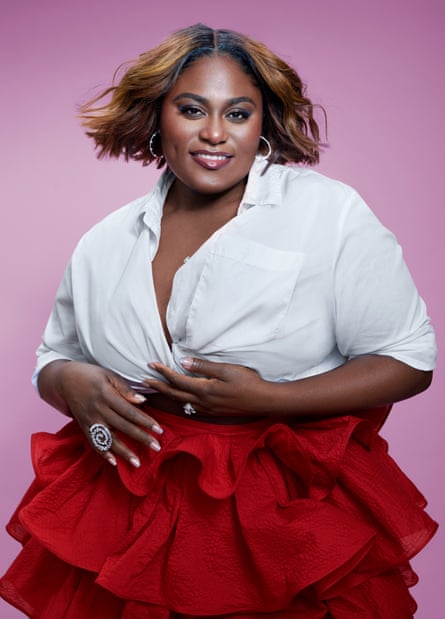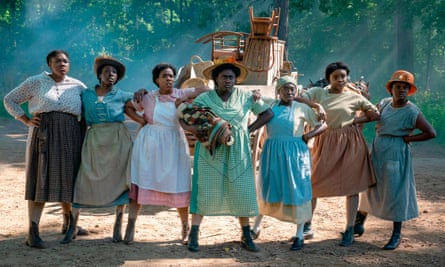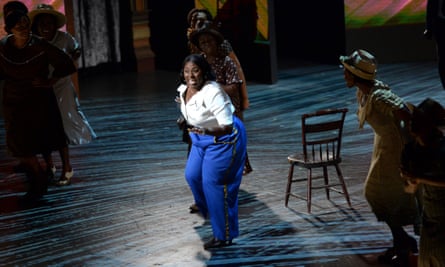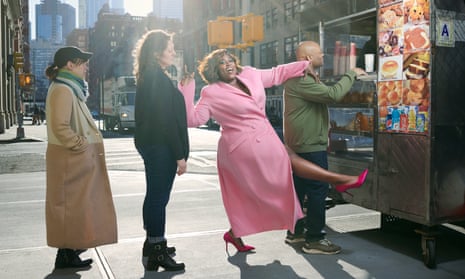Things started to go wrong one morning in May. It was 2016 and Danielle Brooks was, by all possible metrics, killing it. Having launched her career in the radical prison dramedy Orange is the New Black, she was starring on Broadway in The Color Purple. That day she was meant to be joining the cast on breakfast TV to perform – the Tony nominations were about to be announced – but she couldn’t make it out of the house, nerves making her feet heavy. She watched instead from home and when her nomination was announced she “cried a puddle of tears”. They had a show that night. She’d performed hundreds of times by then, but that night, singing the song Hell No – “All my life I had to fight! But if a man raise his hand, Hell no” – she realised she was out of key.
“I’d just got Tony nominated,” she remembers. “Everyone’s rooting for me and I feel like a failure. I’m so embarrassed. I go back to my dressing room and I start crying. And I’m like, ‘I can’t do this. I just… can’t.’” She skipped the show the next night and saw her therapist instead. “I tell her, ‘I just don’t feel like I can do it.’” It took some work to get back on stage, but the thing that did it, the thing that really helped, was that song: Hell No. “I was finding my strength through the character – thank God I was playing Sofia because she’s a woman who doesn’t care what people think.” This was the same role that made Oprah Winfrey famous in Spielberg’s 1985 adaptation of Alice Walker’s novel, a character Winfrey described as the “embodiment of self-empowerment”.
“Sofia’s gonna live in her power and her strength regardless, so singing Hell No for me became an anthem,” says Brooks. “Hell no to my fears. No to impostor syndrome, no to believing I’m not enough. I fought to stay on that stage eight shows a week for a year.” The song got her through. It also got her a starring role in the new movie adaptation of the musical. The week we meet it’s announced she’s been nominated for a Golden Globe. This time the award nomination “Felt like…” she smiles, “it felt like validation, because I didn’t believe really in my talent and my ability. And then the more I spent time with myself and got to know me and my craft, the more I started to be able to validate myself and not need that so much from others. So, when I watched the announcement, this calm peace washed over me.” She is grinning now, walking around a hotel room in New York in a vest, no makeup, her internet reception crackling in and out. “It felt like the sense of arrival I had been preparing for.”
It has all felt like something of a homecoming in fact. A series of arrivals, a grand fateful circle. Brooks is 34 now. The Color Purple was the first big theatre show she ever saw, aged 15, and “it changed my life”. She means it literally. “I’m from a small town in South Carolina, where the closest you’re gonna get to being in films is becoming a news anchor. Nobody was making it out at the time. And so I finally saw a path for myself when I watched that performance.” She was sitting high up in the mezzanine and when the curtain fell she was so elated she cried. “I saw people who looked like me. Their skin was dark like mine. Felicia P Fields [who played Sofia] was a plus-size woman. Oh my gosh, this was spiritual work. And, of course, I grew up in church all my life.” Brooks’s mother is a minister and her father a deacon. “I could suddenly clearly see where I could go.” She enrolled at a performance arts high school, then at 17 she got into Juilliard. “When I graduated though, it was a real struggle, because at the time what was happening in television and film did not truly reflect me. A 21-year-old, dark skinned curly haired plus-size girl, I did not see it.” Which is not to say there were not roles for women of colour. It’s just…” her lips purse as though she’s tasted something sour. “I saw women in their 40s who were playing ‘big mammas’ and the ‘sassy Black woman’. But I knew coming out of Juilliard, there was so much more to my talent than that. I really struggled with identity in this industry and with fitting in.” And then she auditioned for Orange is the New Black. She almost didn’t take the part – her first script was a shower scene and they wanted her to be topless, “And coming from a Christian background, I was really fearful. I can’t start my career off being the girl who just takes off her clothes. But I needed the money, so I ended up taking the role.” And? “I’m so glad I did.”

In every performance, Brooks manages to balance comedy, rage and tragedy with a swift sort of lightness. Her character, Taystee, was the emotional core of OITNB, jolly and hopeful, despite a life graduating from one violent institution to the next. Brooks was the breakout star of the show, her storylines echoing what was happening in the news. After seven seasons of optimism, there was no justice for Taystee by the end of the show, her fate reflecting America’s grim criminal justice system.
It was partly taking on this character that opened her eyes to the ways her work overlapped with her activism. “Doing work like The Color Purple, where we are delving into the fundamentals of what it is to be a human, what it is to forgive, to love, to get back up again, to be a radical woman – that’s powerful. And that’s why people try to ban movies and they try to ban books, because there is a power in what we do.” What did the story teach her? “It helped me understand you can defeat the oppressor. You can have redemption, you can rewrite wrongs. You can be the strength you need for yourself. That you can be the hero of your own story.”
As well as an opportunity to be “herself” – no grooming, no Spanx – OITNB for Brooks was, “about getting to the heart of the prison system. We were talking about issues, like ICE [US Immigration and Customs Enforcement], we were talking about issues like Black Lives Matter, we were giving voice to the voiceless.” It went further, too – they launched an initiative to help incarcerated women, the Poussey Washington Fund, which Brooks is proud of and energised by. “I’m not trying to run for president or anything, that’s not my calling in life at all. But I do that political work through my art and it goes beyond just being on screen. For me, it’s also about expanding the box for people that look like me in this industry. I love doing things like Peacemaker [a spinoff series from blockbuster The Suicide Squad] and playing an action hero. I’d never seen a plus-size Black woman play a superhero, have you?” Nope! “Right! I remember watching Queen Latifah growing up and her doing romcoms, and I was like, ‘Thank you!’ The world sees her as beautiful. Maybe I could do a romcom one day.’ There’s work in that, too.”

When she first took the part in the musical revival of The Color Purple, she was introduced to Oprah Winfrey, who was a producer. “But I was just too shy to approach her. I didn’t want her to think I wanted anything from her. I just hid in a corner and whenever she waved at me I’d wave back.” It wasn’t until Winfrey surprised her on a Zoom to tell her she’d got the movie part that the two connected, leading to a mentoring relationship that Brooks cherishes and discusses with a sort of shy glee. “At the end of a two-hour phonecall with Miss O, I knew in that moment my life was going to change. I felt, ‘OK, this is going to be a beautiful experience.’” People kept telling Brooks that Winfrey’s were big shoes to fill. “But the thing that I appreciate about Miss O is I feel like she gave me permission to be the cobbler of my own shoe. I was able to freely bring all of myself to the role, because she personally passed the baton.”
Winfrey advised Brooks to keep returning to a quote from Maya Angelou: “I come as one, but I stand as 10,000.” It resonated. “The more specific you are, the more universal the story becomes. It’s not just people of colour who are dealing with abuse and loss, and fears and oppression. Everyone can find themselves within this story, somewhere.”

In 2019, she and her husband Dennis Gelin had a daughter, Freeya. “Because we want her to always be reminded that she’s free in this world. It’s also a reminder to myself, every day, to remain free.” They moved from New York to Georgia, to live “the simple life a little bit. And remember that I don’t have to conform to the norms of being in this industry.” What does freedom mean to her? “It means I can truly move how I want. Not worrying what anyone thinks about the choices I make. Ultimate freedom is loving people and loving yourself.”
How has the industry and her relationship with it, impacted this? Well, she thinks, and pauses, and begins again. “Sometimes the industry limits the voices of people of colour. Then every five years or so we get a Color Purple or Black Panther, or Hidden Figures. But I want more consistency with our stories being told and more expansiveness.” And personally? “I really want us to break out of these European norms of what beauty is. I’d say we are unfair to differences. The industry should start to break those cycles. Get out of this idea that you can only sell a movie if you hire somebody who looks a certain way.” Orange is the New Black proved that was not true, she says. “We were universal,” in their prison uniforms and untamed hair, “and people gravitated towards all of these women, in all their stories.”

She has always thought a lot about beauty, its limits and privilege and how to expand its definition. “I haven’t always seen myself as beautiful – I’ve had to fake it. I know that has a lot to do with the industry – everywhere I go, the world has been telling me that I’m not beautiful enough.” A shift happened when she saw herself on a billboard in Times Square, modelling for the American clothing company Lane Bryant. Suddenly, she says, the possibilities felt limitless. “I see the beauty in myself now. When you have a kid and your body changes, there’s all of this internal work you have to do to accept that. Bringing life into this world was one of the most spectacular things I could have done. So why would I beat my body up for gaining more stretch marks and more inches in my waist? That’s so cruel!” She’s interested now in using her platform to encourage everybody to “celebrate people for where they are”.
But each of the roles she’s played have helped her, she realises, celebrate herself. She’s talking about the time she played Mahalia Jackson (the gospel singer and civil rights activist), and her part in Lena Dunham’s Girls, and, of course, in The Color Purple. “Sofia has helped me to own my power and live in it and bask in it, knowing I don’t have to fake it till I make it any more.” She’s pacing, earnest, brow furrowed. “I don’t have to dim my light for anyone. I don’t have to shy away from the gift I have within me. I’m not going to do that any more.” And suddenly, she laughs.
The Color Purple is released on 26 January
Hair by Tish Celestine using Design Essentials, Mielle and Chi; makeup by Keita Moore using Maybelline for The Only Agency; digitech by Sarah Keum; first assistant Jacob Polcyn-Evans; second assistant Maxim Diaz Raczynski; retouching Jill Lewis; styling assistant Kelly Augustine
